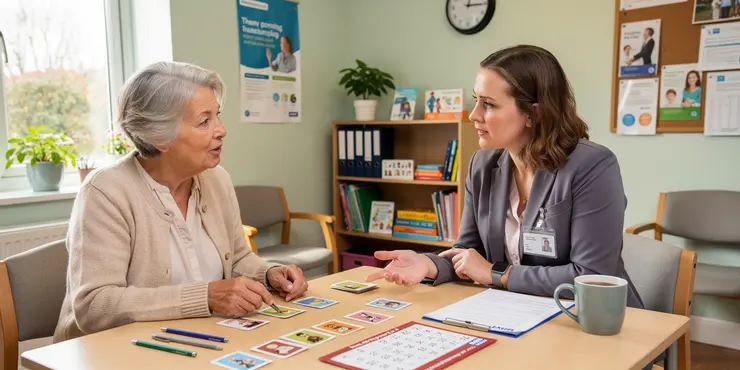
Find Help
More Items From Ergsy search
-
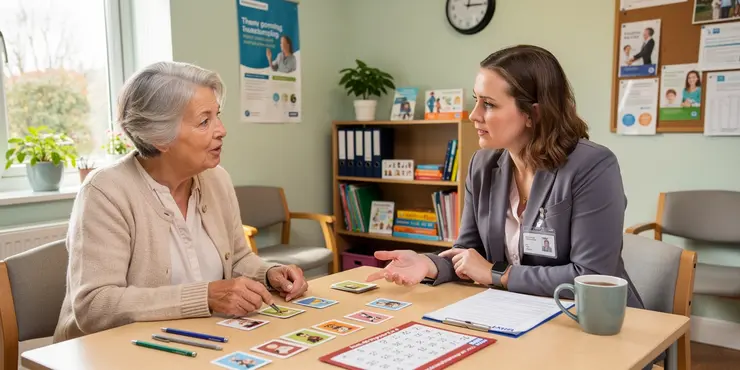
Is there a cure for dementia?
Relevance: 100%
-

What is dementia?
Relevance: 64%
-
Is there a cure for dementia?
Relevance: 57%
-
Is there a cure for dementia?
Relevance: 57%
-

Early onset dementia | NHS
Relevance: 57%
-
Living with dementia | NHS
Relevance: 56%
-
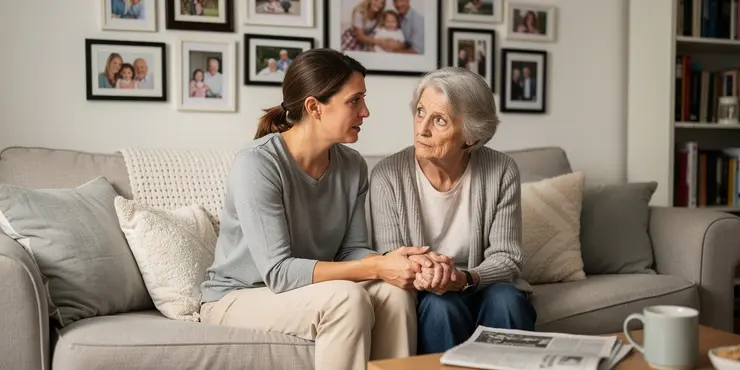
Can dementia affect younger people?
Relevance: 52%
-
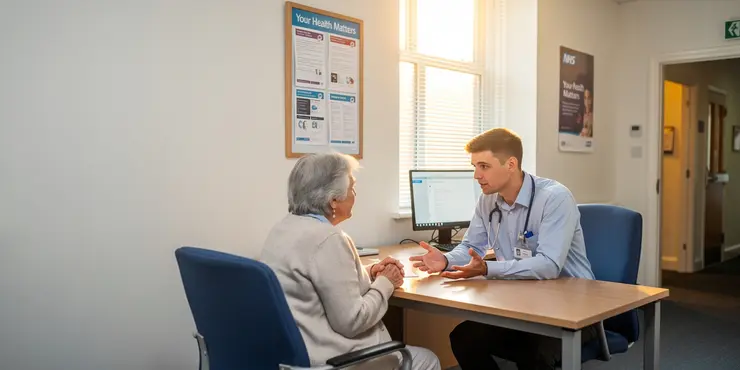
Dementia by Dr Alex Kakoullis, Coventry and Warwickshire Partnership NHS Trust
Relevance: 52%
-
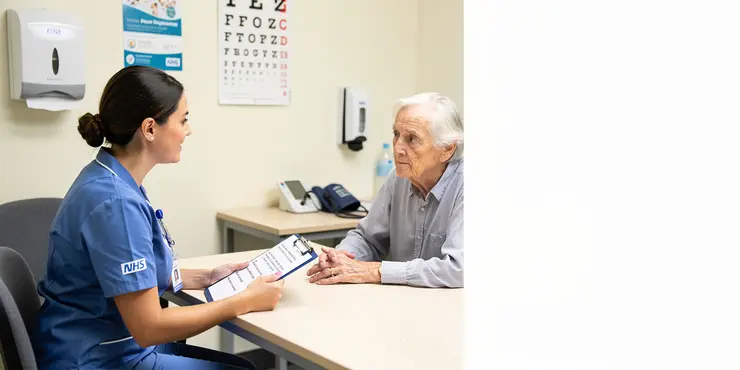
How is dementia diagnosed?
Relevance: 50%
-
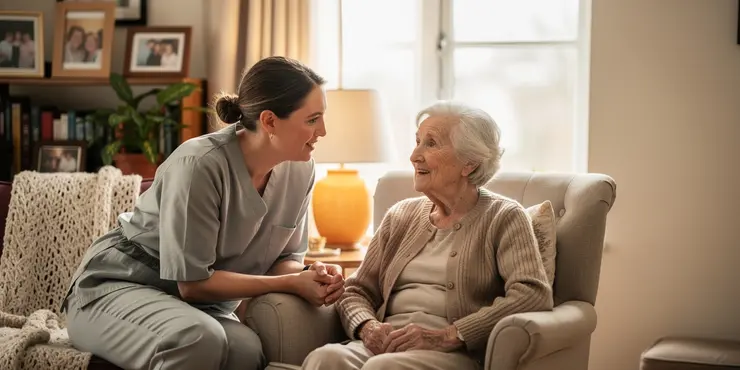
Dementia Care at Colten Care
Relevance: 48%
-
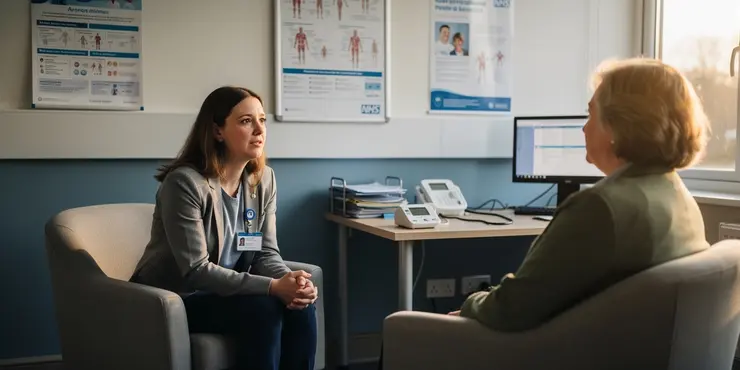
How does dementia progress over time?
Relevance: 48%
-

Is there a cure for ADHD?
Relevance: 48%
-

Are there any support groups for people with dementia in the UK?
Relevance: 47%
-
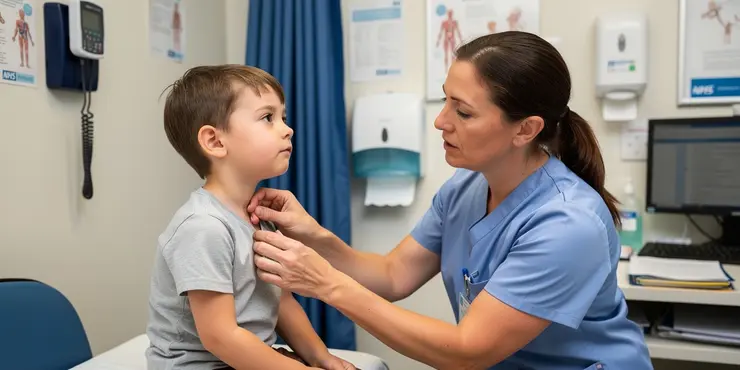
Is there a cure for eczema?
Relevance: 47%
-

Can autism be cured?
Relevance: 47%
-
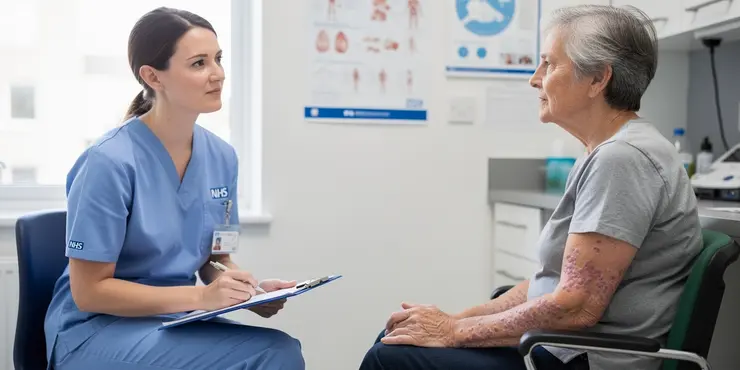
Is there a cure for psoriasis?
Relevance: 47%
-
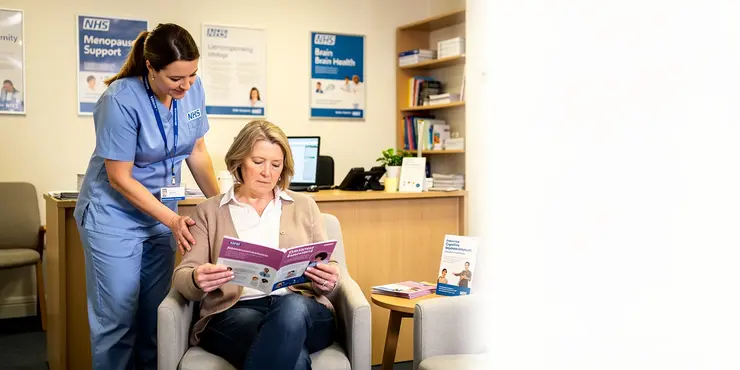
Is there scientific evidence linking menopause to dementia?
Relevance: 47%
-
Are there specific types of dementia linked to menopause?
Relevance: 46%
-
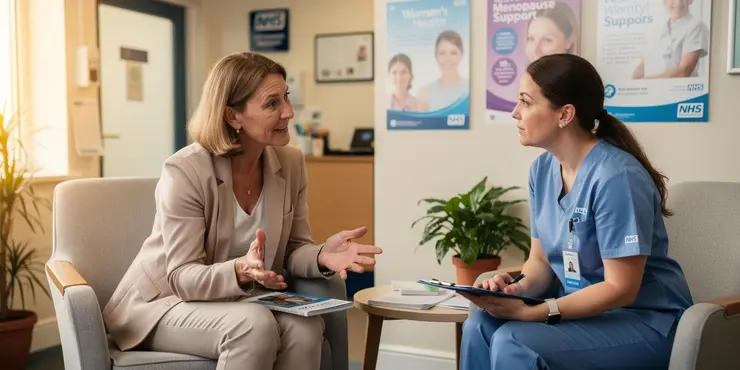
What are the links between menopause and dementia?
Relevance: 46%
-
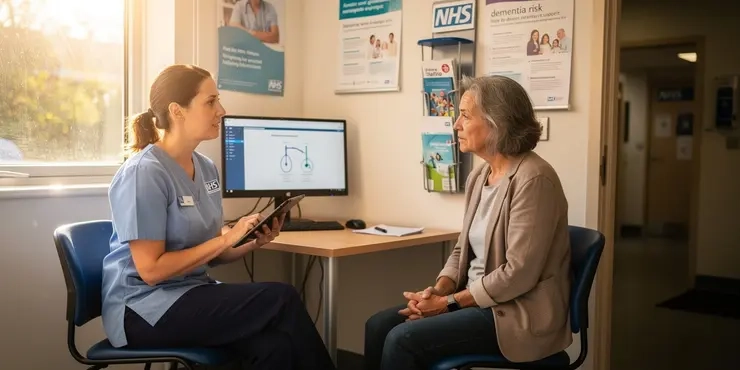
Do genetics play a role in dementia risk post-menopause?
Relevance: 46%
-
Can tinnitus be cured?
Relevance: 46%
-
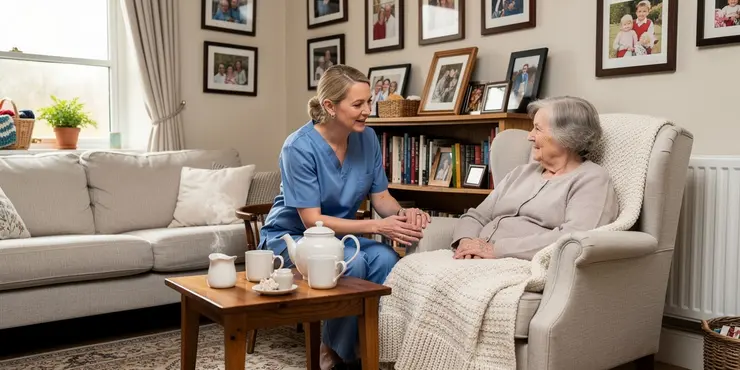
Can live-in care support individuals with dementia?
Relevance: 45%
-

Can asthma be cured?
Relevance: 45%
-
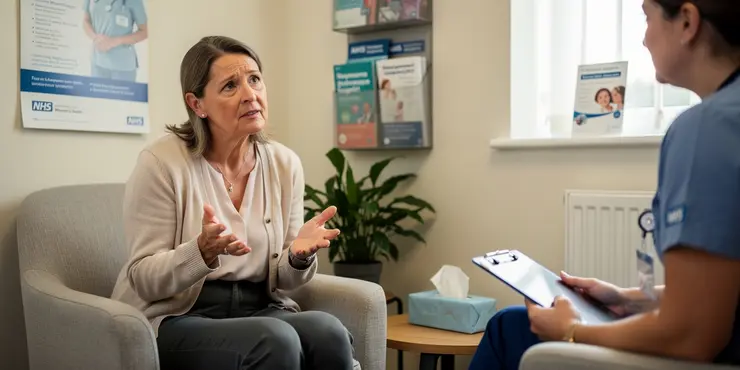
Is the age of menopause onset related to dementia risk?
Relevance: 45%
-
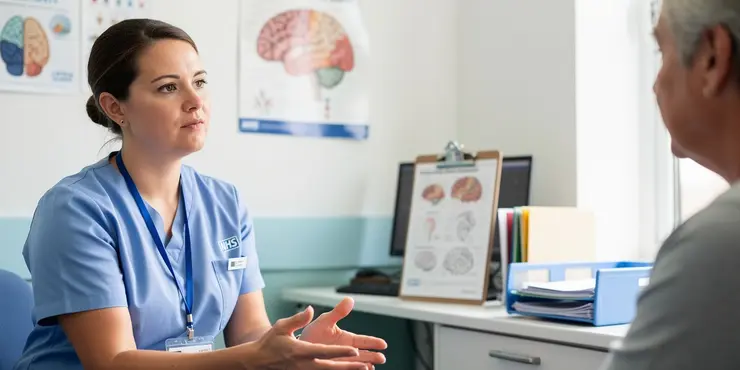
An introduction to frontotemporal dementia (FTD) (part 1/3)
Relevance: 45%
-

What is dementia?
Relevance: 45%
-
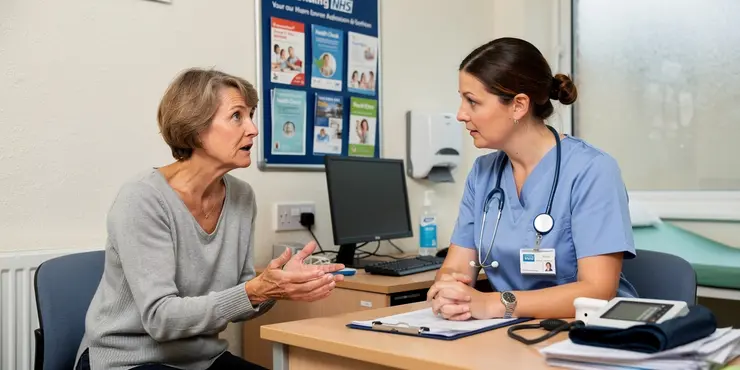
How common is it for women to develop dementia after menopause?
Relevance: 45%
-
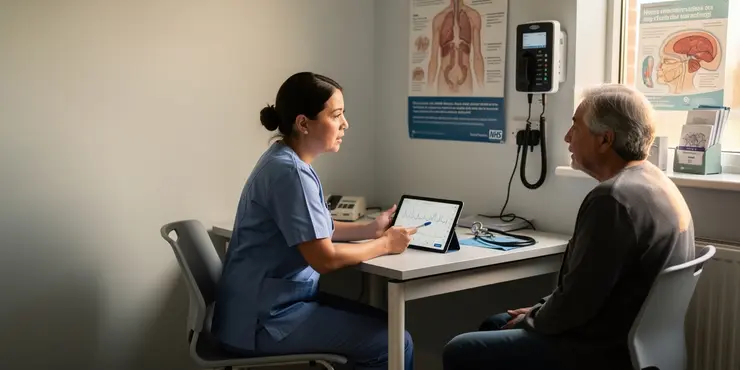
Can sleep apnea be cured?
Relevance: 45%
-
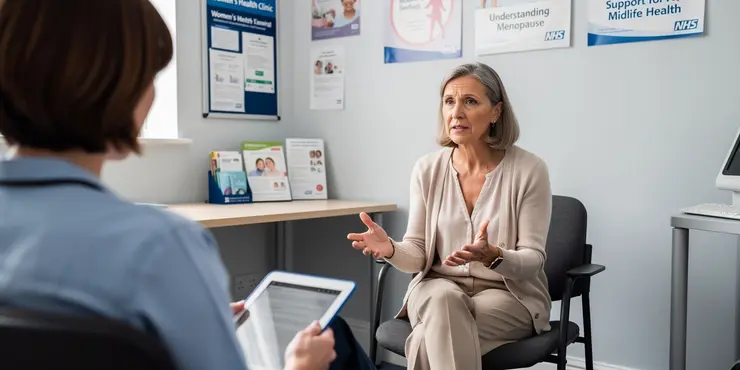
What further research is needed about menopause and dementia?
Relevance: 44%
-
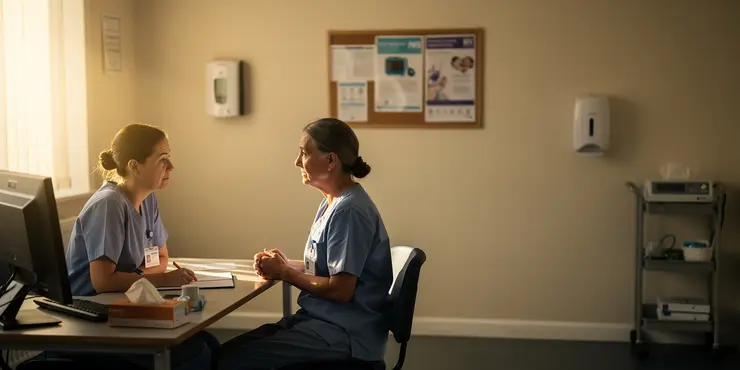
Can Huntington's disease be cured?
Relevance: 44%
-
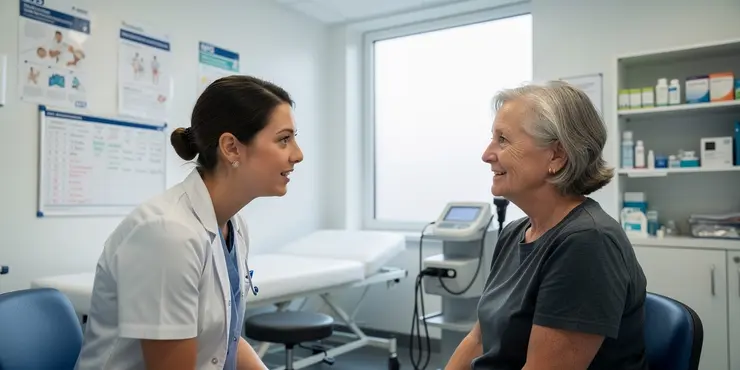
Is there a cure for Crohn's disease?
Relevance: 44%
-
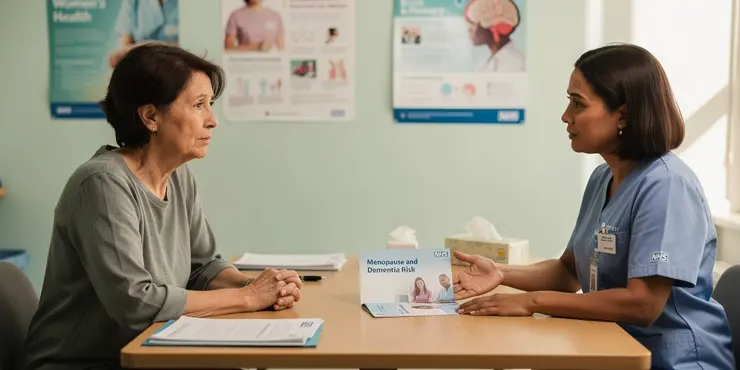
How does menopause potentially affect dementia risk?
Relevance: 44%
-
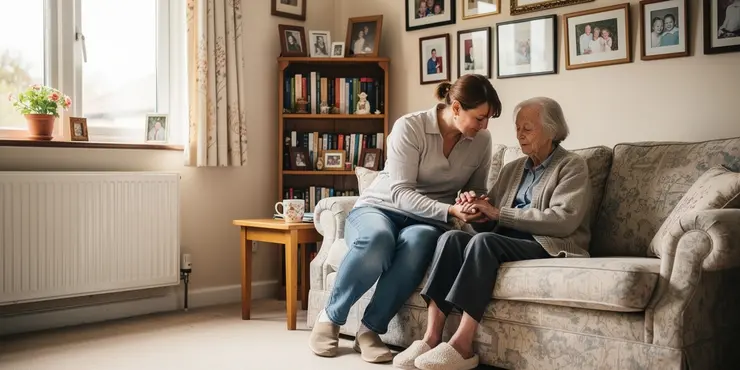
What role do carers play for those living with dementia?
Relevance: 43%
-
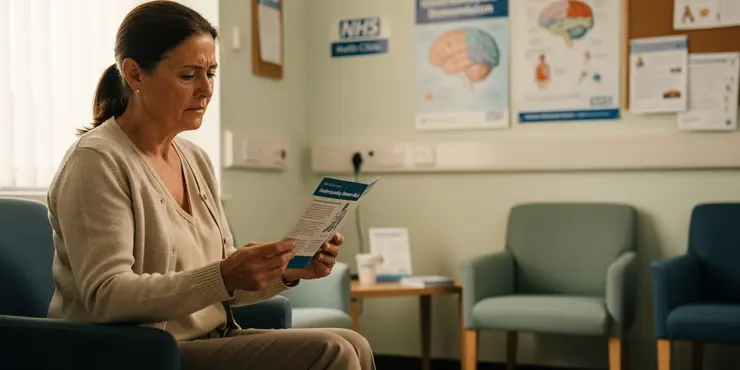
Do male and female brains age differently regarding dementia risk?
Relevance: 43%
-
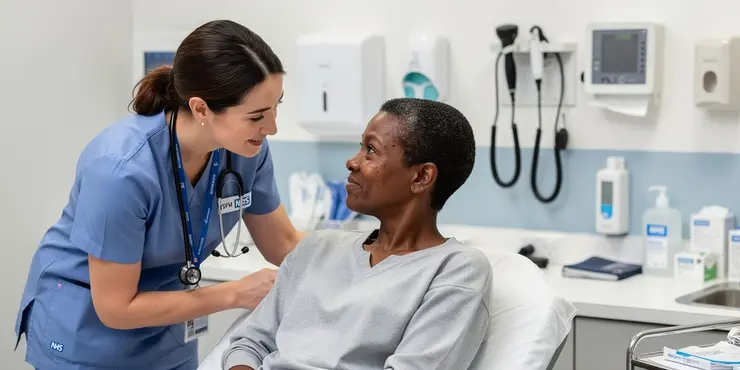
What is the principle of 'like cures like'?
Relevance: 43%
-
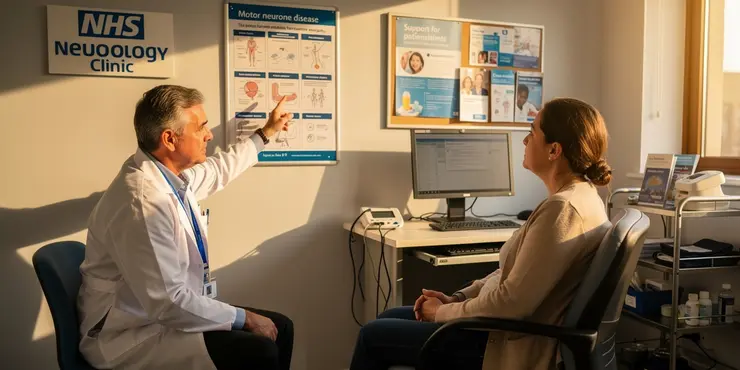
Is there a cure for motor neurone disease?
Relevance: 43%
-

Is there a way to cure a cold quickly?
Relevance: 43%
-
What symptoms can overlap between menopause and the early stages of dementia?
Relevance: 42%
-

Can hormone replacement therapy (HRT) impact dementia risk?
Relevance: 42%
-

Is there a cure for nut allergies?
Relevance: 42%
Understanding Dementia
Dementia is an umbrella term used to describe a range of progressive neurological disorders, which affect memory, thinking, behavior, and the ability to perform everyday activities. Alzheimer's disease is the most common form of dementia, but there are many others, including vascular dementia, Lewy body dementia, and frontotemporal dementia. As a progressive condition, dementia symptoms gradually worsen over time, impacting quality of life and independence.
Current Treatment Options
While there is currently no cure for dementia, there are treatments available that can help manage symptoms and improve life quality. Medications such as cholinesterase inhibitors (donepezil, rivastigmine, galantamine) can help improve some symptoms of Alzheimer’s disease by boosting levels of a chemical messenger involved in memory and judgment. Another drug, memantine, works differently and can be used in moderate to severe cases.
In addition to medication, non-drug therapies, including cognitive stimulation therapy and behavioral therapy, are often recommended. These therapies can support people with dementia in managing changing behaviors and maintaining mental function. Lifestyle changes, such as a healthy diet, regular exercise, and cognitive training, are also encouraged to support overall brain health.
Research and Future Possibilities
There is a significant amount of ongoing research aimed at finding a cure for dementia. Scientists are exploring various avenues, such as understanding the biology of dementia, genetics, and the role of inflammation in the brain. New treatments in development include drugs targeting amyloid and tau proteins, which are linked to Alzheimer’s disease, and therapies focused on reducing inflammation and improving vascular health.
Stem cell research is another promising field. Scientists are investigating the potential of stem cells to repair damage in the brain and restore function. Although these approaches are still in the experimental stage, they offer hope for the future development of effective treatments.
Support and Resources
In the UK, a range of support options is available for people living with dementia and their families. Organisations such as the Alzheimer’s Society and Dementia UK provide resources, support groups, and practical advice for managing the challenges associated with the condition. These organisations also play a critical role in raising awareness and funds for research into new treatments and potential cures.
While a cure for dementia does not currently exist, the ongoing advancements in research and increased understanding of the disease provide hope for the future. In the meantime, focusing on effective management of symptoms and providing support for those affected remains a top priority.
Understanding Dementia
Dementia is a word we use to talk about illnesses that slowly damage the brain. This makes it hard to remember things, think clearly, and do everyday tasks. Alzheimer’s disease is the most common type of dementia. Other types are vascular dementia, Lewy body dementia, and frontotemporal dementia. Dementia gets worse over time, which makes it harder to live independently.
Current Treatment Options
Right now, there is no way to stop dementia, but there are ways to help with the symptoms. Doctors can give some medicines like donepezil, rivastigmine, and galantamine to help with Alzheimer's symptoms. Another medicine, memantine, is used for more serious cases.
Besides medicine, there are other ways to help. Therapy sessions and doing brain exercises can be beneficial. It’s also important to eat healthy, exercise, and keep the mind active to help the brain stay healthy.
Research and Future Possibilities
Scientists are working hard to find a cure for dementia. They study how dementia works in the brain, how genes are involved, and how brain swelling might be related. New medicines may help by targeting specific proteins linked to Alzheimer's or by reducing brain swelling.
Another interesting idea is stem cell research. Stem cells might help fix damage in the brain. These ideas are still being tested, but they offer hope for better treatments one day.
Support and Resources
In the UK, there are many ways to get help for people with dementia and their families. Organisations like the Alzheimer’s Society and Dementia UK offer support groups and advice on living with dementia. They also work to teach people about dementia and raise money for research.
Even though there is no cure for dementia right now, researchers are learning more all the time. This gives us hope for the future. For now, it’s essential to manage symptoms well and support people with dementia and their families.
Frequently Asked Questions
Is there a cure for dementia?
Currently, there is no cure for dementia, but treatments are available to manage symptoms.
Can dementia be reversed?
Dementia caused by certain reversible conditions, like vitamin deficiencies, can be improved, but most types of dementia are not reversible.
Are there treatments available for dementia?
Yes, there are treatments that can help manage symptoms of dementia, including medications and therapy.
Why is there no cure for dementia yet?
Dementia is a complex condition with various underlying causes. Research is ongoing to better understand and develop treatments.
What are the current research areas for dementia?
Current research on dementia focuses on understanding its causes, developing new medications, and exploring lifestyle interventions.
Can lifestyle changes help with dementia?
Lifestyle changes, such as a healthy diet, regular exercise, and mental stimulation, may help manage symptoms and potentially slow progression.
Are there new drugs for dementia treatment?
Several new drugs are in development and clinical trials to treat dementia, but many are still being tested for safety and efficacy.
How effective are current dementia treatments?
Current treatments can help manage symptoms but are not effective in stopping the progression of the disease.
What is the future outlook for dementia treatments?
Advances in research hold promise for future treatments that could slow or stop the progression of dementia.
What are the most common types of dementia?
The most common types of dementia include Alzheimer's disease, vascular dementia, Lewy body dementia, and frontotemporal dementia.
Are there preventive measures for dementia?
While prevention is not guaranteed, maintaining a healthy lifestyle and managing risk factors may help reduce the risk of developing dementia.
Can early diagnosis improve dementia outcomes?
Early diagnosis can help manage symptoms more effectively and allow for better planning and support.
Is there a genetic test for dementia?
Genetic tests can identify certain risk factors, especially for familial forms of Alzheimer's disease, but having a risk gene does not guarantee dementia.
What role does nutrition play in dementia?
Good nutrition is important for overall brain health and may help in managing some symptoms of dementia.
Can dementia be detected early?
There are methods for detecting dementia early, such as cognitive assessments and imaging tests, which help in planning for care and treatment.
Is dementia a normal part of aging?
No, dementia is not a normal part of aging, although age is the greatest risk factor.
What supportive therapies are available for dementia?
Supportive therapies include occupational therapy, speech therapy, and cognitive stimulation activities.
How do cognitive exercises impact dementia?
Cognitive exercises may help maintain mental function and slow the progression of symptoms in some individuals.
What are the challenges in finding a cure for dementia?
Challenges include the complexity of the brain, the diversity of dementia types, and the lack of understanding of the disease's biology.
Can social interaction affect dementia progression?
Social interaction is beneficial and can help improve mood and cognitive function in people with dementia.
Can dementia be cured?
No, there is no cure for dementia right now.
You can do things to help like:
- Taking medicine
- Eating healthy food
- Doing exercises for your body and brain
- Talking to a doctor often
These can help you feel better.
Right now, there is no way to make dementia go away. But doctors can help with some of the problems it causes.
Can we make dementia better?
Dementia is a sickness that makes it hard to remember things and think clearly.
Right now, doctors cannot make dementia go away. But they can use medicine to help the brain do better.
To help someone with dementia, it is important to:
- Talk to them slowly and clearly.
- Use pictures to help explain things.
- Keep a routine to make each day feel the same.
- Use tools like phone reminders or notes to remember things.
If you know someone with dementia, being patient and kind helps them a lot.
Some types of memory problems, like those caused by a lack of certain vitamins, can get better. But most memory problems cannot be fixed and do not go away.
Is there help for dementia?
Yes, there are ways to help people with dementia feel better.
Doctors can give medicine to help. There are also activities and exercises that can help the brain and body stay strong.
It's important to talk to a doctor and get the right help.
Family and friends can support too by spending time and being kind.
Using pictures, simple words, and speaking slowly can help people understand better.
Yes, there are ways to help people with dementia feel better. This includes medicine and talking to a therapist.
Why don't we have a cure for dementia?
Dementia is a very tricky illness. It makes it hard for doctors to find one simple answer.
Here are some reasons why:
- The brain is very complex: Dementia affects many parts of the brain, and we are still learning how the brain works.
- Different types of dementia: There are many kinds of dementia, like Alzheimer’s, and each needs a different treatment.
- Research takes time: Finding new medicines and tests takes a lot of time and work.
Doctors and scientists are trying hard to find a cure. Tools like memory games and puzzles can help keep your brain active. You can also talk to a doctor if you have questions or worries.
Dementia is a medical problem that can make it hard for some people to remember things and think clearly. Scientists are working hard to learn more about it and find ways to help people with dementia.
What are scientists studying about dementia now?
Right now, scientists are trying to learn more about dementia. They want to know what causes it, make new medicines, and find ways to help with healthy living.
Can changing how you live help with dementia?
Dementia makes it hard to remember things and think clearly.
Here are some simple ways to help:
- Eat Healthy: Eating fruits and vegetables can help your brain.
- Exercise: Moving your body is good for your brain.
- Stay Social: Spend time with friends and family.
- Keep Learning: Try puzzles or new hobbies to keep your brain busy.
- Sleep Well: Good sleep helps your brain work better.
If remembering is hard, here’s how to make it easier:
- Use reminders on your phone.
- Write notes to help you remember.
- Ask others to help you with tasks.
Making changes in your life can help. Eating healthy food, exercising often, and doing activities that make you think can help with symptoms and might slow things down.
Are there new medicines to help treat dementia?
People with dementia have trouble with memory and thinking. Scientists are working hard to find new medicines to help. New medicines help improve memory and everyday life for people with dementia. Some new treatments are being tested by doctors. It takes time to make sure these medicines are safe and work well. Using pictures and videos can help to understand how these medicines work. Support from family or friends is important when learning about new treatments.
Scientists are making new medicines to help people with dementia. But they are still checking if these medicines are safe and work well.
Do dementia treatments work well?
Dementia is a condition that affects the brain. It can make it hard to remember things or think clearly.
Treatments are ways that doctors try to help people with dementia. Some treatments work better than others.
Doctors and researchers are always looking for new ways to make treatments better.
If you or someone you know has dementia, it is good to talk to a doctor. They can explain the best treatments available.
Using tools like calendars or reminder notes can also help. These are simple things that can make daily life easier for someone with dementia.
Today’s treatments can make you feel better, but they cannot stop the disease from getting worse.
What Will Happen with Dementia Treatments in the Future?
Scientists are learning new things. This might help doctors find ways to treat dementia better. They hope to slow down or stop dementia from getting worse in the future.
What are the most common types of dementia?
Dementia is a brain illness that makes it hard to remember, think, or do daily tasks. Here are some common types:
- Alzheimer's Disease: This is the most common type. People forget things easily and may get confused.
- Vascular Dementia: This happens when blood flow to the brain is not good. It affects thinking skills.
- Lewy Body Dementia: People may see things that are not there and can be confused.
- Frontotemporal Dementia: It affects behavior and language. People may act differently or have trouble talking.
To help understand more, you can:
- Use pictures to explain each type.
- Ask a family member or friend to read it with you.
- Use audiobooks or videos about dementia.
There are different kinds of dementia. The most common ones are Alzheimer's disease, vascular dementia, Lewy body dementia, and frontotemporal dementia.
Can you stop dementia from happening?
We can't promise to stop dementia. But living a healthy life and watching out for things that might cause it can help lower the chances of getting it.
Can finding out early help people with dementia feel better?
Dementia is a condition that affects the brain. It makes it hard for people to remember things and think clearly.
If doctors find out someone has dementia early, they might be able to help more. This can help the person feel better longer.
Here are some things that can help people with dementia:
- Talking to a doctor regularly
- Doing puzzles and games to keep the mind active
- Having a routine to remember daily tasks
Family and friends can also help by being patient and supportive.
Finding out early can help manage symptoms better. It also helps you plan and get support.
Can a test tell if you will get dementia?
Scientists have made tests that look at your genes. These tests can show if you might get dementia one day. But, it is important to know that genes are just one part. Just because you have a gene, does not mean you will definitely get dementia.
If you want to know more, talk to a doctor. They can help you understand these tests better. They might also use pictures and simple words to explain. Remember, it is always good to ask questions if you do not understand.
Genetic tests can find risk factors. This means they can tell if there is a chance of getting a disease, like in some families who have Alzheimer's. But just because you have a risk gene, it doesn't mean you will definitely get dementia.
How does food help if someone has dementia?
Eating healthy food is good for your brain. It can help you feel better and may help if you have some problems with memory.
Can we find out about dementia early?
Dementia means changes in the brain that make it hard to remember things or think clearly. It can make daily life tricky.
Doctors can help find dementia early. They ask questions and do tests. This can help people get support sooner.
If you think you or someone you know might have dementia, talk to a doctor. It's good to talk about it early.
Things that can help:
- Memory games
- Staying active
- Eating healthy food
- Talking with friends and family
There are ways to find out if someone might have dementia early. Doctors use thinking tests and special brain scans. This helps them plan how to care for and treat the person.
Does everyone get dementia when they get older?
No, dementia is not something that happens to everyone as they get older. But getting older can make it more likely to happen.
What helps people with dementia feel better?
Here are some things that can help people with dementia:
- Talking with a therapist to share feelings.
- Playing music to relax or remember.
- Doing puzzles or games to keep the brain active.
- Exercise to move the body and feel good.
- Art or painting to express feelings.
- Using simple tools like picture books to help remember things.
These activities can help make life easier and more enjoyable for someone with dementia.
Helpful therapies are things like occupational therapy, speech therapy, and activities that help the brain think better.
How do brain games help people with memory problems?
Playing brain games can be good for people who have trouble remembering things.
These games can help keep the mind active and strong.
Here are some tips to make brain games more fun:
- Play with friends or family. It's more fun together!
- Use a timer. See how fast you can finish a puzzle.
- Try different games to keep things exciting.
Remember, it's okay to ask for help if you get stuck. Have fun and keep your brain busy!
Brain games can help keep your mind sharp and slow down symptoms for some people.
What makes it hard to find a cure for dementia?
The brain is very complicated. Dementia comes in many different types. We do not fully understand what causes the disease yet.
Does Spending Time with People Help with Dementia?
Spending time with other people is good. It can help people with dementia feel happier. It can also help their brain work better.
Useful Links
This website offers general information and is not a substitute for professional advice.
Always seek guidance from qualified professionals.
If you have any medical concerns or need urgent help, contact a healthcare professional or emergency services immediately.
Some of this content was generated with AI assistance. We’ve done our best to keep it accurate, helpful, and human-friendly.
- Ergsy carfully checks the information in the videos we provide here.
- Videos shown by Youtube after a video has completed, have NOT been reviewed by ERGSY.
- To view, click the arrow in centre of video.
- Most of the videos you find here will have subtitles and/or closed captions available.
- You may need to turn these on, and choose your preferred language.
- Go to the video you'd like to watch.
- If closed captions (CC) are available, settings will be visible on the bottom right of the video player.
- To turn on Captions, click settings .
- To turn off Captions, click settings again.
More Items From Ergsy search
-

Is there a cure for dementia?
Relevance: 100%
-

What is dementia?
Relevance: 64%
-
Is there a cure for dementia?
Relevance: 57%
-
Is there a cure for dementia?
Relevance: 57%
-

Early onset dementia | NHS
Relevance: 57%
-
Living with dementia | NHS
Relevance: 56%
-

Can dementia affect younger people?
Relevance: 52%
-

Dementia by Dr Alex Kakoullis, Coventry and Warwickshire Partnership NHS Trust
Relevance: 52%
-

How is dementia diagnosed?
Relevance: 50%
-

Dementia Care at Colten Care
Relevance: 48%
-

How does dementia progress over time?
Relevance: 48%
-

Is there a cure for ADHD?
Relevance: 48%
-

Are there any support groups for people with dementia in the UK?
Relevance: 47%
-

Is there a cure for eczema?
Relevance: 47%
-

Can autism be cured?
Relevance: 47%
-

Is there a cure for psoriasis?
Relevance: 47%
-

Is there scientific evidence linking menopause to dementia?
Relevance: 47%
-
Are there specific types of dementia linked to menopause?
Relevance: 46%
-

What are the links between menopause and dementia?
Relevance: 46%
-

Do genetics play a role in dementia risk post-menopause?
Relevance: 46%
-
Can tinnitus be cured?
Relevance: 46%
-

Can live-in care support individuals with dementia?
Relevance: 45%
-

Can asthma be cured?
Relevance: 45%
-

Is the age of menopause onset related to dementia risk?
Relevance: 45%
-

An introduction to frontotemporal dementia (FTD) (part 1/3)
Relevance: 45%
-

What is dementia?
Relevance: 45%
-

How common is it for women to develop dementia after menopause?
Relevance: 45%
-

Can sleep apnea be cured?
Relevance: 45%
-

What further research is needed about menopause and dementia?
Relevance: 44%
-

Can Huntington's disease be cured?
Relevance: 44%
-

Is there a cure for Crohn's disease?
Relevance: 44%
-

How does menopause potentially affect dementia risk?
Relevance: 44%
-

What role do carers play for those living with dementia?
Relevance: 43%
-

Do male and female brains age differently regarding dementia risk?
Relevance: 43%
-

What is the principle of 'like cures like'?
Relevance: 43%
-

Is there a cure for motor neurone disease?
Relevance: 43%
-

Is there a way to cure a cold quickly?
Relevance: 43%
-
What symptoms can overlap between menopause and the early stages of dementia?
Relevance: 42%
-

Can hormone replacement therapy (HRT) impact dementia risk?
Relevance: 42%
-

Is there a cure for nut allergies?
Relevance: 42%


